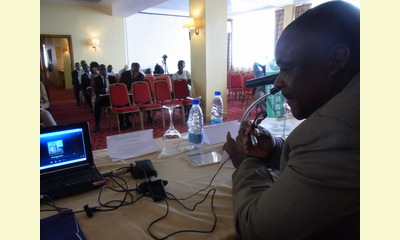|
|
Poster exhibition on the atomic bomb damage
un articulo por campad
Coincidentally the day when this article was prepared is the Peace Memorial Day for Hiroshima, the 6th of August. 67 years ago, in 1945, the atomic bomb was dropped in Hiroshima and it is said that about 140,000 people were killed because of the damage of the atomic bomb. Even today, thousands of citizens still suffer the aftereffects of radiation and emotional pain. To prevent any repetition of this tragedy, the cities of Hiroshima and Nagasaki have continually sought to sensitize about the inhumane cruelty of nuclear weapons and have consistently urged nuclear weapons to be abolished.

Press conference on the upcoming poster exhibition held on the 25th of May 2012, in Yaoundé, Cameroon
click on photo to enlarge
“Mayors for Peace” was a network NGO established in 1982 to achieve the mission above. It is composed of cities around the world that have formally expressed support for the program Mayor Araki announced in 1982. As of August 1, 2012, membership stood at 5,312 cities in 153 countries and regions.
To commemorate the number of member cities of “Mayors for Peace” which exceeded the 5000 city-milestones, the 8th Executive Conference of “Mayors for Peace” in November 2011, adopted an agenda that “Mayors for Peace” would create a new poster exhibit at all our member cities on the atomic bomb damage. The first poster exhibition will be in Vienna, Austria in May 2012 along with the first Preparatory Committee meeting for the NPT Review Conference.
Around August 2012, or others memorial days such as like the International Peace day, the exhibition will be held in other cities by using public places. Please make inquiries to the city where you live if they will organize this poster exhibition. If you live in Cameroon, please feel free to come to the poster exhibition at Djeuga Palace Hotel in Yaoundé starting from the 3rd to 8th of September 2012. The official opening ceremony, projecting documentary film and symposium on abolishment of nuclear weapons are also planned during that period.
|








|
DISCUSSION
Pregunta(s) relacionada(s) al artículo :
Can we abolish all nuclear weapons?,
* * * * *
Comentario más reciente:
'THE WORLD IS OVER-ARMED AND PEACE IS UNDER-FUNDED'
30 August 2012 — The following opinion piece by Secretary-General BAN Ki-moon has appeared in leading newspapers in Argentina, Bangladesh, Burundi, China, Germany, India, Iran, Italy, Japan, Lebanon, Malaysia, The Philippines, Republic of Korea, Russia, Serbia, Turkey, Ukraine and European weekly publications and has been translated into 10 languages.
Last month, competing interests prevented agreement on a much-needed treaty that would have reduced the appalling human cost of the poorly regulated international arms trade. Meanwhile, nuclear disarmament efforts remain stalled, despite strong and growing global popular sentiment in support of this cause.
The failure of these negotiations and this month's anniversaries of the atomic bombings at Hiroshima and Nagasaki provide a good opportunity to explore what has gone wrong, why disarmament and arms control have proven so difficult to achieve, and how the world community can get back on track towards these vitally important goals.
Many defence establishments now recognize that security means far more than protecting borders. Grave security concerns can arise as a result of demographic trends, chronic poverty, economic inequality, environmental degradation, pandemic diseases, organized crime, repressive governance and other developments no state can control alone. Arms can't address such concerns.
Yet there has been a troubling lag between recognizing these new security challenges, and launching new policies to address them. National budget priorities still tend to reflect the old paradigms. Massive military spending and new investments in modernizing nuclear weapons have left the world over-armed -- and peace under-funded.
Last year, global military spending reportedly exceeded $1.7 trillion – more than $4.6 billion a day, which alone is almost twice the UN's budget for an entire year. This largesse includes billions more for modernizing nuclear arsenals decades into the future.
This level of military spending is hard to explain in a post-Cold War world and amidst a global financial crisis. Economists would call this an "opportunity cost". . ... continuación.

|
|








